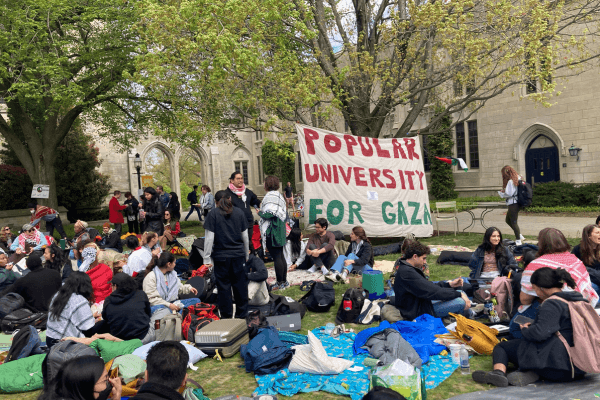We should all be deeply troubled by the recent announcement by U.S. Attorney General William Barr that the federal government plans to resume executions.
Not only did he announce his intention, but he also announced that there are five executions planned. For perspective, that is more federal executions than we have had in over 50 years combined — we’ve only had three federal executions since 1963.
After 16 years without a federal execution, this is a step in the wrong direction.
When it comes to executing people, these are the most pro-death countries in the world: China, Iran, Saudi Arabia, Iraq, and the United States. The U.S. is always in the top 10, and usually in the top five. When it comes to human rights, this is not the best company to keep.
Most of the world has done away with the death penalty — in fact, the U.S. stands alone in the Western, industrialized world when it comes to executing our own citizens.
Each of the 62 men in the federal prison in Terre Haute, Ind., are quite likely guilty of horrible crimes, and those crimes should have consequences. To be anti-death-penalty is not to be anti-victim or anti-justice. To be anti-death penalty is simply to insist that we can deal with violent crime without mirroring the violence and taking another life.
We often like to say we reserve the death penalty for the “worst of the worst,” but that isn’t the case. Jeffrey Dahmer didn't get the death penalty. Charles Manson died of natural causes in prison. Harvard-educated Ted Kaczynski is still alive. We're not executing the "worst of the worst" — we are executing the poorest of the poor, and disproportionately people of color. The most reliable determinant of who is executed is not the atrocity of the crime, but the resources of the defendant and other arbitrary things like the race of the victim(s). The death penalty is a failed experiment in the U.S.
For decades, we have been moving away from the death penalty as a country. The number of executions drops nearly every year. New death sentences, a good indicator of the death penalty’s future, are the lowest they’ve been in 40 years. The U.S. is steadily abandoning the archaic idea that we can kill to show that it is wrong to kill. Public opinion is opposed to the death penalty in the highest numbers in nearly a generation, especially among young Christians. According to a 2014 Barna Group poll, only 23 percent of practicing Christian millennials support the death penalty. Almost every year a new state abolishes the death penalty, and only a handful of states and outlier counties are actively executing.
It is deeply troubling to think that the federal government would overextend its reach to pursue execution even for crimes committed in states that have abolished the death penalty. And, in contrast to state laws, the federal government lists some 60 death-worthy crimes including espionage and treason.
The first federal execution scheduled is Lezmond Mitchell, a member of the Navajo nation, where there is no death penalty because capital punishment violates tribal custom and culture. The victims’ family and the Navajo Nation, where the crime took place, oppose the death penalty. Despite that and the fact that only one Native American was on the jury during the trial, the government pursued the death penalty and is putting Mitchell on the gurney first.
It obviously raises important concerns about how much we trust our imperfect criminal justice system with the irreversible power of life and death. We know that for every nine executions in the U.S., there has been one exoneration. That’s a terrible track record – can you imagine if one in every 10 planes crashed?
For decades we have been moving away from the machinery of death to pursue more effective, cost-efficient, humane, and redemptive means of criminal justice. The death penalty extends trauma, exacerbates wounds, and creates more victims. We can do better. In the industrialized world, we have ways to protect the public from people who are dangerous – without killing them.
The charge to keep the death penalty alive is being led, almost exclusively, by leaders who claim to be Christians. It must break the heart of the God who said, “Mercy triumphs over judgment” and “Blessed are the merciful for they will be shown mercy.”
But Christians also have a long line of saints who have spoken out faithfully for life over the centuries, including Mother Teresa, Martin Luther King Jr., and now Pope Francis. One of the great thinkers of the early church, Cyprian, took note of the irony that when an individual kills another individual we call it evil, but when the State kills another individual we sanctify it and call it justice.
The death penalty contradicts the gospel and undermines the possibility of redemption for which Christ died. There is nothing Christ-like or pro-life about the death penalty. Christ shows us a God who would rather die than kill … a Savior who is executed and who died with forgiveness on his lips, even for those who were killing him.
It is heartbreaking to hear the news that the Trump administration will attempt to resume federal executions. In a world with so much violence, why would we want to add more? Violence is the problem, not the solution.
Got something to say about what you're reading? We value your feedback!







